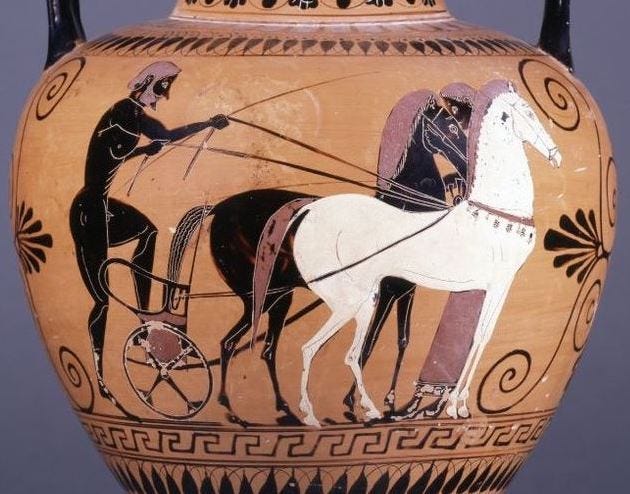Plato's Republic - Part 7
The foundational premise of Plato’s tripartite view of the human soul
Rumbling Toward Heaven is a newsletter for lifelong learners interested in culture and education, thoughtful reflections on great literature, and meaningful insights into human flourishing. Monthly and annual paid subscriptions are 50% OFF until the end of April (normally $5 a month/$50 annually). Use this link to SUBSCRIBE and read everything that has been published here.
In this concluding analysis of Book One of Plato’s Republic, it is crucial to keep in mind that Book One acts as a foundation or “a prelude” to the entire project of the Republic. It sets the stage for everything else that will be unpacked in the rest of work.
In Part 6 of this series, we looked at the first two of three dynamics taking place in laying the foundation.
First, Plato built a political community by working through the dialogue of his characters. He has, of course, distanced himself from purporting any political ideas himself, and instead, challenges the common notions of justice popular in Athens. Through Socrates’ dialogue with each interlocutor, he shows each definition of justice his community gives to be less satisfactory than the one before it.
Cephalean justice, “giving what is owed,” is the most noble, but it is incomplete and falls short. Polemarchean justice, “doing good to friends and evil to enemies,” is more philosophic in nature, but it raises more questions than it answers, and is ultimately more vicious than it is virtuous. Finally, Thrasymachean justice is the worst. It is relativistic and purely unjust. By the work of his elenchus, Socrates has cleared the way to begin a fresh inquiry into the idea of justice.
Second, the interlocutors embody Plato’s view of the human soul and its various reflections in the regimes of the political community. Socrates is noetic, a philosopher; and his nature is reflected in the Aristocratic form of government. Cephalus is old and has therefore lost his passions, but he is a wealthy man who spent his life seeking wealth, and honor by it. He is the traditionalist, and his nature is reflected in the Timocratic form of government. Polemarchus is a slave owner, and the heir of Cephalus’ wealth. His nature is reflected in the Oligarchic form of government. And, Thrasymachus is eristic and violent. His nature represents the Tyrannical form of government.
This leaves Glaucon and Adeimantus as the representative natures of Democracy still in its healthy state.
The third dynamic playing out in the prelude is the relationship between the natures of the soul, itself.




